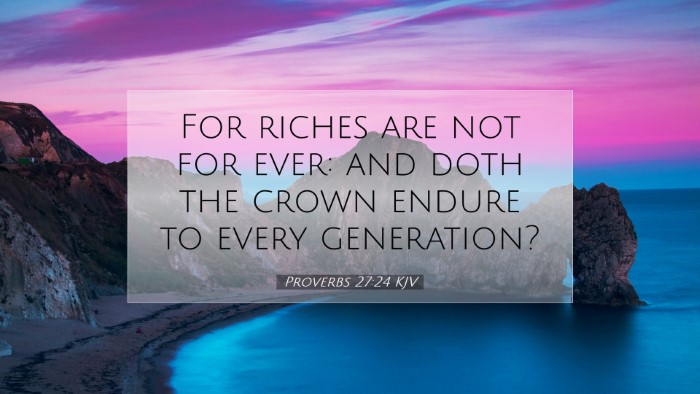Commentary on Proverbs 27:24
Verse: "For riches are not forever: and doth the crown endure to every generation?" (Proverbs 27:24)
Introduction
The wisdom of Proverbs offers timeless truths about life, human relationships, and the transient nature of material wealth. In this verse, Solomon conveys a critical perspective on riches and power, reminding us of their impermanence and the importance of prioritizing eternal values.
Contextual Analysis
This verse is situated within the broader context of Proverbs 27, which addresses themes of friendship, prudence, and the realities of life's uncertainties. It stands as a poignant reminder amid discussions about human interactions and the fleeting nature of earthly possessions.
Insights from Public Domain Commentaries
Matthew Henry
Matthew Henry emphasizes the fleeting nature of wealth and the uncertainty surrounding it. He notes that riches do not last forever and warns against placing our hope and trust in material possessions. Henry asserts that while wealth may come and go, character and the reverence of God are enduring values. He also reflects on the idea that crowns—symbols of authority and success—are often not passed down to subsequent generations; what is substantial today may prove insubstantial tomorrow.
Albert Barnes
Albert Barnes discusses the transient qualities of both wealth and honor in his commentary. He contends that riches are prone to decay, theft, or unwise spending. Furthermore, he points out that kings and rulers may arise and fall—a common theme throughout the history of Israel and humanity at large. Barnes underscores that no crown or authority is immune to the passage of time and that one generation's prosperity can quickly become another's loss. He advises readers to keep their lives anchored in the spiritual and the eternal rather than in the temporary and material.
Adam Clarke
Adam Clarke brings attention to the notion of stability that believers should seek. He interprets "For riches are not forever" to signify the inevitability of change in fortune. Clarke states that one should not invest their hope in wealth since it can vanish suddenly. Instead, he suggests that true security lies in godliness and a relationship with God, whom he identifies as the ultimate source of lasting value. Clarke's perspective reminds us that our endeavors should aim at spiritual wealth rather than material accumulation, aligning with the broader biblical narrative that values the eternal over the temporary.
Theological Reflection
Proverbs 27:24 serves as a theological reflection on God's sovereignty over human affairs. It reminds us of the fickleness of life and encourages a reevaluation of our priorities. Wealth can indeed provide for temporal needs; however, it pales compared to the richness found in a relationship with God. The fear of the Lord is often cited throughout Proverbs as the beginning of wisdom, indicating the alignment of our lives with divine principles as the path to genuine fulfillment.
Application for Pastors and Scholars
For pastors, this verse can serve as a basis for teaching congregants about the importance of placing their hope in God rather than in uncertain riches. Sermons could focus on the necessity of spiritual wealth, influencing congregational life to prioritize prayer, fellowship, and service over materialism.
Students and scholars can engage with this text by exploring its implications regarding contemporary societal values, particularly in cultures excessively driven by consumerism. This verse can inspire discussions about economic ethics and Christian stewardship in both personal and collective contexts.
Conclusion
The wisdom encapsulated in Proverbs 27:24 remains a profound reminder of life's transient nature. The insights gathered from respected commentators like Matthew Henry, Albert Barnes, and Adam Clarke help deepen our understanding of this verse and its applications to our lives. As believers, we are called to live with an eternal perspective, recognizing that the true treasures of the heart lie far beyond material possessions.


